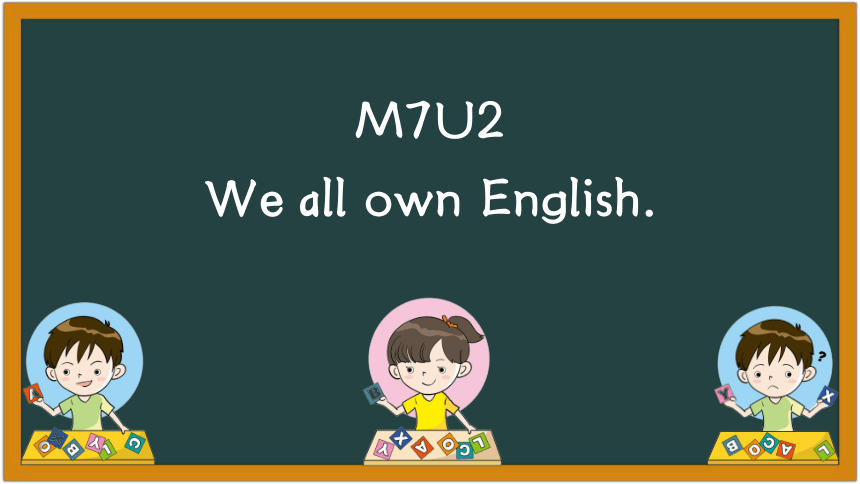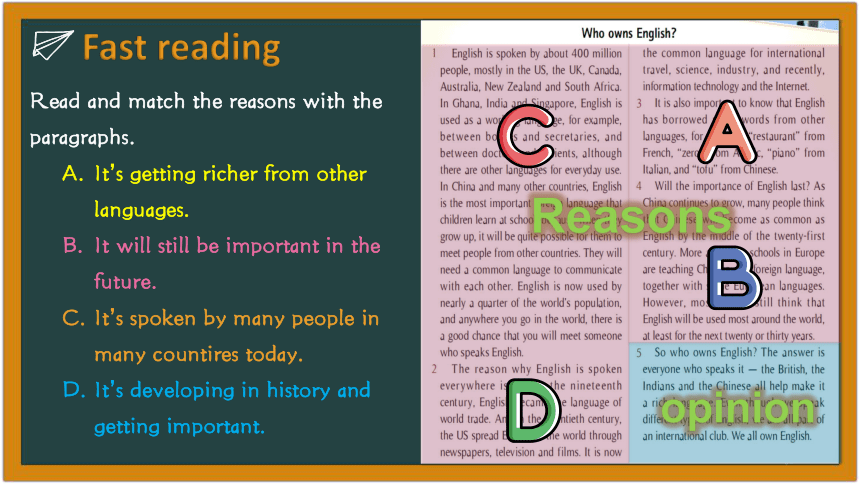外研版九年级下册 Module 7 English for you and me Unit 2 We all own English 课件(共19张PPT)+内嵌音频
文档属性
| 名称 | 外研版九年级下册 Module 7 English for you and me Unit 2 We all own English 课件(共19张PPT)+内嵌音频 |  | |
| 格式 | pptx | ||
| 文件大小 | 18.8MB | ||
| 资源类型 | 教案 | ||
| 版本资源 | 外研版 | ||
| 科目 | 英语 | ||
| 更新时间 | 2024-08-20 07:24:00 | ||
图片预览







文档简介
(共19张PPT)
M7U2
We all own English.
こんにちは!
你好!
)!
Bonjour!
Hola!
Ciao!
!
Hello!
Which of the following is the most widely used language
Fast reading
Who owns English according to the writer
Tip:Read the first sentence of each paragraph.
opinion
Fast reading
Does the writer give any reasons to support his opinion
In which paragraphs does the writer lay out his reasons
Draw the structrue of the passage.
opinion
Reasons
① ② ③ ④
⑤
Fast reading
Read and match the reasons with the paragraphs.
It’s getting richer from other languages.
It will still be important in the future.
It’s spoken by many people in many countires today.
It’s developing in history and getting important.
opinion
Reasons
It’s spoken by many people in many countires today.
Reason No.1
1. Circle the countries mentioned and the total number of English speakers around the world.
a quarter of the world’ population
Ghana
[ gɑ n ]
加纳
It’s spoken by many people in many countires today.
3.Fill in the table.
Reason No.1
Countries Different roles
the US, the UK, Canada, Australia, New Zealand, South Africa
Ghana, India,Singapore
China and many other countries
Native language/
Mother tongue
Working language/
Official language
The most important foreign language
Why is English the most important language that children need to learn at school in many countries like China
boss
secretary
/ sekr t( )ri /
2. English is spoken by so many people in so many countries. It plays an important role in these countries.
Reason No.2
It’s developing in history and getting important.
How did English spread in the past
In the ____
century
became the language of
___________
English spread to the world through_____
becomes common language for_________________
____________________
becomes the common language for______ and the _________
In the ____ century
now
recently
DEVELOPMENT OF ENGLISH
19th
20th
world trade
media
Internet
IT
international travel, science, and industry
Reason No.3
It’s getting richer from other languages.
To make English _______(rich), other languages have given a big hand, such as “restaurant” from ___________(France), “zero” from ___________(Arab阿拉伯人;阿拉伯的), “piano” from __________(Italy), “tofu” , “Typhoon” from __________ (China), “history” from __________(Greece), Mosquito(蚊子) from ________ (Spain) , “noodle” from _________(Germany) and “Shampoo” from ____________(India).
richer
French
Italian
Chinese
Arabic
Greek
Spanish
German
Indian
dynamic充满活力的,动态变化的
Does this help make English the most widely used language
expressive 有表达力的
Reason No.4
It will still be important in the future.
What are the two different ideas
Many People: Chinese will be as common as English by the middle of the 21st century.
Most People: English will still be used most around the world, at least for the next 20 or 30 years.
Which idea do you agree with
Opinion part
Who do they stand for
The ones who speak English as the working language.
The native speakers
The ones who speak English as the most important foreign language.
have different accents (口音)
How does the writer make the reasons persuasive有说服力的
A. By listing numbers.
B. By giving examples.
C. By quoting famous quotes.(引用名言)
D. By showing historical facts.
E. By comparing different opinions.
Post reading
A
B
B
D
E
A
If you talk to a man in a language he understands, that goes to his head.
If you talk to him in his own language, that goes to his heart.
Language points
mostly 绝大部分
working language=official language 官方语言
everyday adj. 日常的=daily
every day 时间状语 每一天
communicate with sb 与...交流
communication n. 交流
a quarter of 四分之一
There is a good chance that... 很有可能
The reason why ... is that ... ...的原因是...
world trade 世界贸易
Language points
borrow sth from sb
lend sb sth = lend sth to sb
continue to do sth
as common as ... 和...一样常见
by the middle of the twenty-first century 在二十一世纪中叶前
at least 至少
at most 至多
different types of ... 不同种类的...
type n. 种类 v. 打字
Language points
M7U2
We all own English.
こんにちは!
你好!
)!
Bonjour!
Hola!
Ciao!
!
Hello!
Which of the following is the most widely used language
Fast reading
Who owns English according to the writer
Tip:Read the first sentence of each paragraph.
opinion
Fast reading
Does the writer give any reasons to support his opinion
In which paragraphs does the writer lay out his reasons
Draw the structrue of the passage.
opinion
Reasons
① ② ③ ④
⑤
Fast reading
Read and match the reasons with the paragraphs.
It’s getting richer from other languages.
It will still be important in the future.
It’s spoken by many people in many countires today.
It’s developing in history and getting important.
opinion
Reasons
It’s spoken by many people in many countires today.
Reason No.1
1. Circle the countries mentioned and the total number of English speakers around the world.
a quarter of the world’ population
Ghana
[ gɑ n ]
加纳
It’s spoken by many people in many countires today.
3.Fill in the table.
Reason No.1
Countries Different roles
the US, the UK, Canada, Australia, New Zealand, South Africa
Ghana, India,Singapore
China and many other countries
Native language/
Mother tongue
Working language/
Official language
The most important foreign language
Why is English the most important language that children need to learn at school in many countries like China
boss
secretary
/ sekr t( )ri /
2. English is spoken by so many people in so many countries. It plays an important role in these countries.
Reason No.2
It’s developing in history and getting important.
How did English spread in the past
In the ____
century
became the language of
___________
English spread to the world through_____
becomes common language for_________________
____________________
becomes the common language for______ and the _________
In the ____ century
now
recently
DEVELOPMENT OF ENGLISH
19th
20th
world trade
media
Internet
IT
international travel, science, and industry
Reason No.3
It’s getting richer from other languages.
To make English _______(rich), other languages have given a big hand, such as “restaurant” from ___________(France), “zero” from ___________(Arab阿拉伯人;阿拉伯的), “piano” from __________(Italy), “tofu” , “Typhoon” from __________ (China), “history” from __________(Greece), Mosquito(蚊子) from ________ (Spain) , “noodle” from _________(Germany) and “Shampoo” from ____________(India).
richer
French
Italian
Chinese
Arabic
Greek
Spanish
German
Indian
dynamic充满活力的,动态变化的
Does this help make English the most widely used language
expressive 有表达力的
Reason No.4
It will still be important in the future.
What are the two different ideas
Many People: Chinese will be as common as English by the middle of the 21st century.
Most People: English will still be used most around the world, at least for the next 20 or 30 years.
Which idea do you agree with
Opinion part
Who do they stand for
The ones who speak English as the working language.
The native speakers
The ones who speak English as the most important foreign language.
have different accents (口音)
How does the writer make the reasons persuasive有说服力的
A. By listing numbers.
B. By giving examples.
C. By quoting famous quotes.(引用名言)
D. By showing historical facts.
E. By comparing different opinions.
Post reading
A
B
B
D
E
A
If you talk to a man in a language he understands, that goes to his head.
If you talk to him in his own language, that goes to his heart.
Language points
mostly 绝大部分
working language=official language 官方语言
everyday adj. 日常的=daily
every day 时间状语 每一天
communicate with sb 与...交流
communication n. 交流
a quarter of 四分之一
There is a good chance that... 很有可能
The reason why ... is that ... ...的原因是...
world trade 世界贸易
Language points
borrow sth from sb
lend sb sth = lend sth to sb
continue to do sth
as common as ... 和...一样常见
by the middle of the twenty-first century 在二十一世纪中叶前
at least 至少
at most 至多
different types of ... 不同种类的...
type n. 种类 v. 打字
Language points
同课章节目录
- Module 1 Travel
- Unit 1 We toured the city by bus and by taxi
- Unit 2 It's a long story.
- Unit 3 Language in use
- Module 2 Education
- Unit 1 They don't sit in rows.
- Unit 2 What do I like best about school?
- Unit 3 Language in use
- Module 3 Life now and then
- Unit 1 They sometimes work harder.
- Unit 2 I think life is better today.
- Unit 3 Language in use.
- Module 4 Rules and suggestions
- Unit 1 You must be careful of falling stones.
- Unit 2 we must keep the camp clean.
- Unit 3 Language in use.
- Revison A
- Module 5 Look after yourself
- Unit 1 We'd better get you to hospital.
- Unit 2 Get off the sofa!
- Unit 3 Language in use.
- Module 6 Eating togethe
- Unit 1 When is the school-leavers' party?
- Unit 2 Knives and forks are used for most Western
- Unit 3 Language in use
- Module 7 English for you and me
- Unit 1 Have you ever been to an English corner?
- Unit 2 We all own English.
- Unit 3 Language in use
- Module 8 My future life
- Unit 1 Here's to our friendship and the future
- Unit 2 I know that you will be better at maths.
- Unit 3 Language in use
- Revison B
